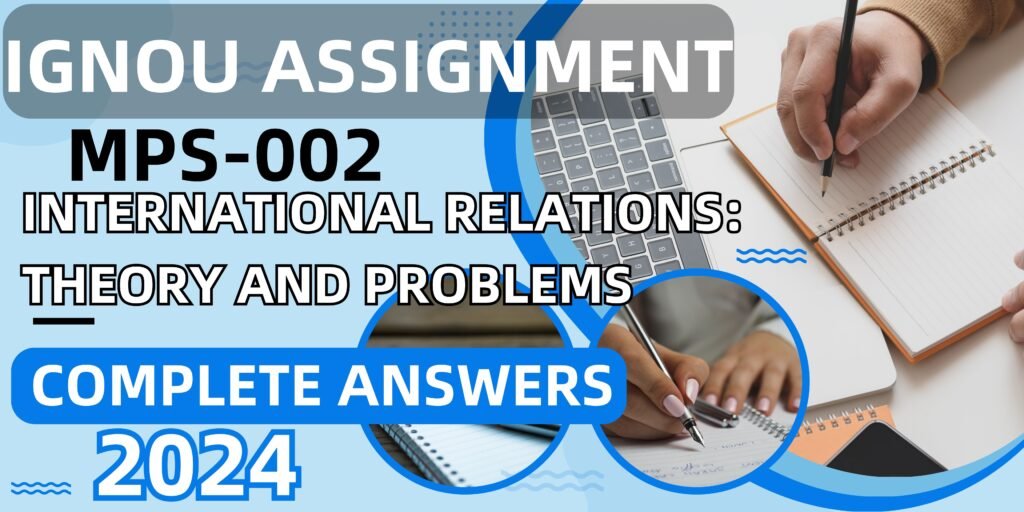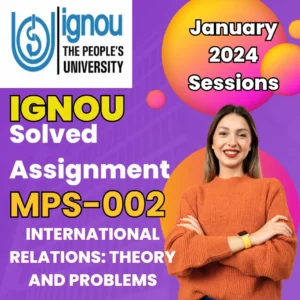IGNOU MPS 2 Assignment Answer 2024
INTERNATIONAL RELATIONS: THEORY AND PROBLEMS
(MPS-002)
TUTOR MARKED ASSIGNMENT
Course Code: MPS-002
Assignment Code: Asst/TMA/2023-24
Marks: 100
Answer five questions in all, selecting at least two questions from each section. Each question is to be answered in about 500 words. Each question carries 20 Marks.
SECTION- I
- Examine the problems involved in securing self –determination in Europe in the 20th century.
- Bring out the essence of the key concepts frequently used in the Realist framework. What purpose do they serve?
- What are the different theoretical approaches to Regionalism? Explain.
- Discuss the evolution of non –proliferation of nuclear weapons in the post –cold war era.
- Briefly explain the motives and the methods adopted by the terrorist to perpetuate violence.
SECTION- II
Write a short note on each part of the following questions in about 250 words:
- a) Impact of Science and technology on military affairs
b) Uneven International Economic System - a) Globalisation
b) Critique of Orientalism - a) Environmental Approaches
b) Feminist theory in International Relations - a) Marxist approach to International Relations
b) Inter –state displacement - a) Causes of Identity wars
b) Nasser’s Three Circles
Click Here download Assignment Questions from Official IGNOU website
Answer of All Questions
Answer five questions in all, selecting at least two questions from each section. Each question is to be answered in about 500 words. Each question carries 20 Marks.
Note: Students should write Only 5 Questions-Answers in this paper, i.e- If you write any 2 Answers in Section-I then you have to write any 3 Answer in Section-II. In that way If you write any 3 Answers in Section-I then you have to write any 2 Answer in Section-II
SECTION- I
1. Examine the problems involved in securing self –determination in Europe in the 20th century.
Securing self-determination in Europe during the 20th century was a complex and challenging endeavor, marked by geopolitical shifts, conflicting national interests, and the aftermath of two devastating world wars. The concept of self-determination, rooted in the idea that nations have the right to determine their political status and freely pursue their economic, social, and cultural development, gained prominence after World War I. However, the practical implementation of this principle faced numerous problems, leading to conflicts and tensions across the continent.
One of the major challenges was the redrawing of borders and the creation of new nation-states after World War I. The Treaty of Versailles in 1919 aimed to establish a new world order by dismantling empires and recognizing the right of self-determination for various ethnic and national groups. However, the application of this principle often led to arbitrary decisions and the imposition of borders that did not align with the ethnic or cultural realities on the ground. This resulted in the creation of unstable and multi-ethnic states, such as Czechoslovakia and Yugoslavia, which struggled to accommodate diverse populations with different national identities.
The rise of totalitarian regimes in the interwar period further complicated the pursuit of self-determination. Nazi Germany and fascist Italy pursued aggressive expansionist policies, challenging the sovereignty of smaller nations. The annexation of Austria and the dismemberment of Czechoslovakia in the late 1930s highlighted the fragility of the principle of self-determination in the face of aggressive military powers. The appeasement policies of Western democracies, seeking to avoid another war, allowed the erosion of self-determination for many European nations.
The Cold War further complicated the pursuit of self-determination in Europe. The division of the continent into Western and Eastern blocs led to the establishment of satellite states under Soviet influence, suppressing the self-determination of nations like Poland, Hungary, and East Germany. The Iron Curtain created a physical and ideological barrier, limiting the ability of Eastern European nations to freely determine their political and economic systems.
The end of the Cold War brought new opportunities for self-determination in Europe. The collapse of the Soviet Union and the disintegration of Yugoslavia allowed for the emergence of several independent states, such as Ukraine, the Baltic nations, and the former Yugoslav republics. However, the process was marred by ethnic conflicts, nationalist tensions, and struggles for power, reflecting the enduring challenges of implementing self-determination in practice.
In conclusion, securing self-determination in Europe during the 20th century was a formidable task fraught with challenges. The aftermath of both World Wars, the rise of totalitarian regimes, the Cold War division, and the collapse of empires all shaped the trajectory of self-determination in the region. While progress was made in certain periods, the ideal of nations freely determining their destiny often collided with geopolitical realities, ethnic complexities, and power dynamics, highlighting the intricate nature of securing self-determination in a complex and ever-changing European landscape.
2. Bring out the essence of the key concepts frequently used in the Realist framework. What purpose do they serve?
The Realist framework, a prominent school of thought in international relations, revolves around key concepts that reflect a pragmatic and power-centric view of the world. Realism emerged as a response to the idealism of the interwar period and has since become a foundational theory in understanding international relations. The key concepts frequently used in the Realist framework include the balance of power, state sovereignty, national interest, and the pursuit of power and security.
Balance of Power: The balance of power is a central concept in Realism, emphasizing the distribution of power among states as a key determinant of international stability. Realists argue that in an anarchic world where there is no overarching authority, states seek to maintain or achieve power to ensure their survival. The balance of power theory suggests that states will align themselves strategically to prevent any single state or coalition from becoming overwhelmingly dominant. This concept serves the purpose of promoting stability and deterring aggression by ensuring that no state can impose its will on others unchecked.
State Sovereignty: Realism places a high value on state sovereignty, emphasizing the autonomy and independence of states in the international system. States are considered the primary actors, and their sovereignty is seen as crucial for maintaining order and stability. The principle of state sovereignty serves the purpose of acknowledging the reality of a world consisting of sovereign entities, each pursuing its own interests. Realists are skeptical about the effectiveness of international institutions in restraining state behavior, as they believe that states prioritize their own interests above all. (Continue….)
Click Here for Complete Answer
Download Complete Answer PDF
-
MA Political Science IGNOU MPS-001 Assignment Solutions
Original price was: ₹299.00.₹29.00Current price is: ₹29.00. Add to cart -
MA Political Science IGNOU- MPS-002 Assignment Solutions
Original price was: ₹299.00.₹29.00Current price is: ₹29.00. Add to cart -
MA Political Science IGNOU- MPS-003 Assignment Solutions
Original price was: ₹299.00.₹29.00Current price is: ₹29.00. Add to cart -
MA Political Science IGNOU- MPS-004 Assignment Solutions
Original price was: ₹299.00.₹29.00Current price is: ₹29.00. Add to cart
Also Read:
- IGNOU (MPS-001) Political Theory Assignment Answers
- IGNOU (MPS-003) INDIA: DEMOCRACY AND DEVELOPMENT Assignment Answer 2024
Click Here for More
ignou mps 2 assignment answer 2024 ignou mps 2 assignment answer 2024 ignou mps 2 assignment answer 2024 ignou mps 2 assignment answer 2024 ignou mps 2 assignment answer 2024 ignou mps 2 assignment answer 2024 ignou mps 2 assignment answer 2024 ignou mps 2 assignment answer 2024 ignou mps 2 assignment answer 2024 ignou mps 2 assignment answer 2024 ignou mps 2 assignment answer 2024 ignou mps 2 assignment answer 2024 ignou mps 2 assignment answer 2024
ignou mps 2 assignment answer 2024 ignou mps 2 assignment answer 2024 ignou mps 2 assignment answer 2024 ignou mps 2 assignment answer 2024 ignou mps 2 assignment answer 2024 ignou mps 2 assignment answer 2024 ignou mps 2 assignment answer 2024 ignou mps 2 assignment answer 2024 ignou mps 2 assignment answer 2024 ignou mps 2 assignment answer 2024 ignou mps 2 assignment answer 2024 ignou mps 2 assignment answer 2024 ignou mps 2 assignment answer 2024 ignou mps 2 assignment answer 2024 ignou mps 2 assignment answer 2024







